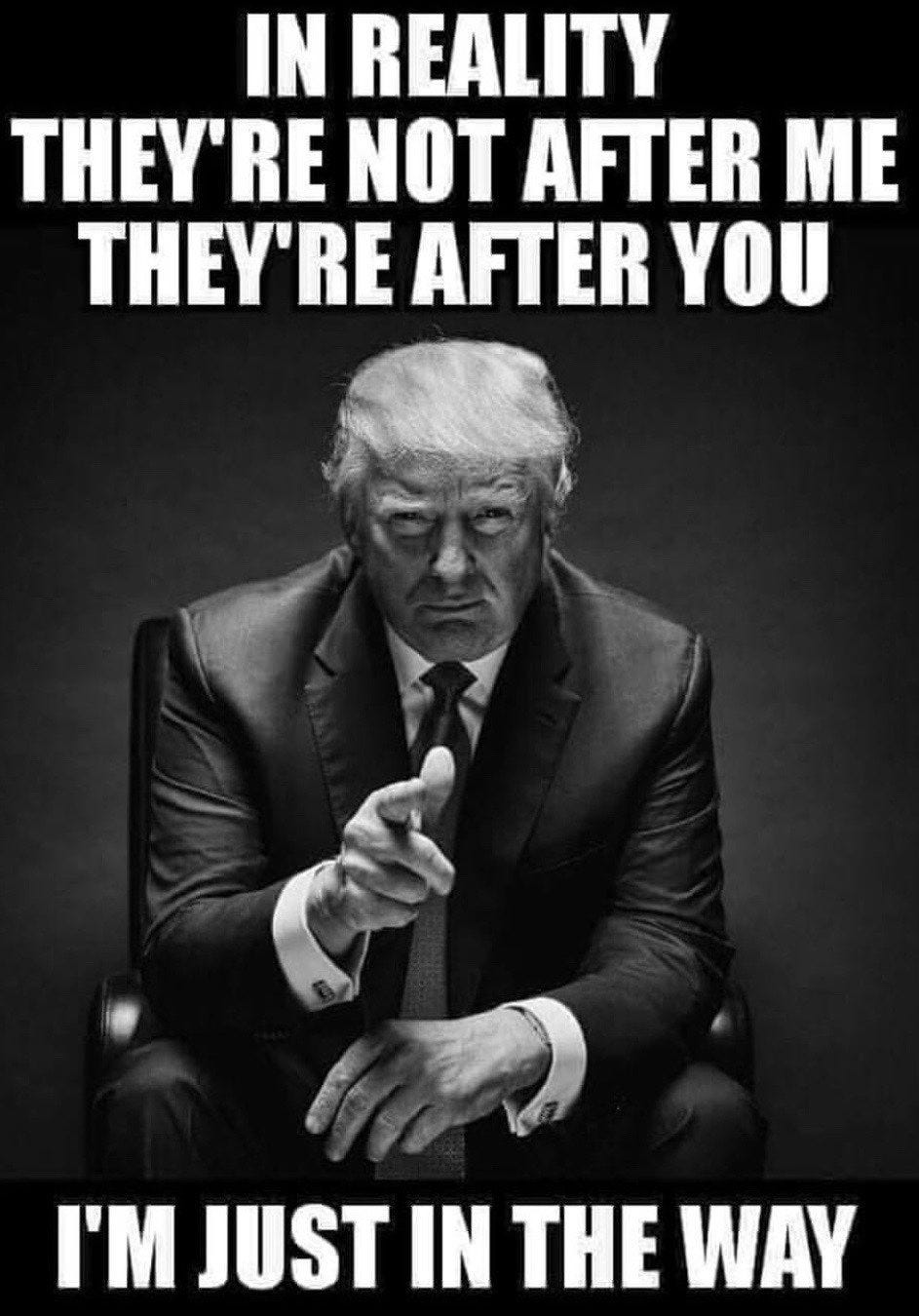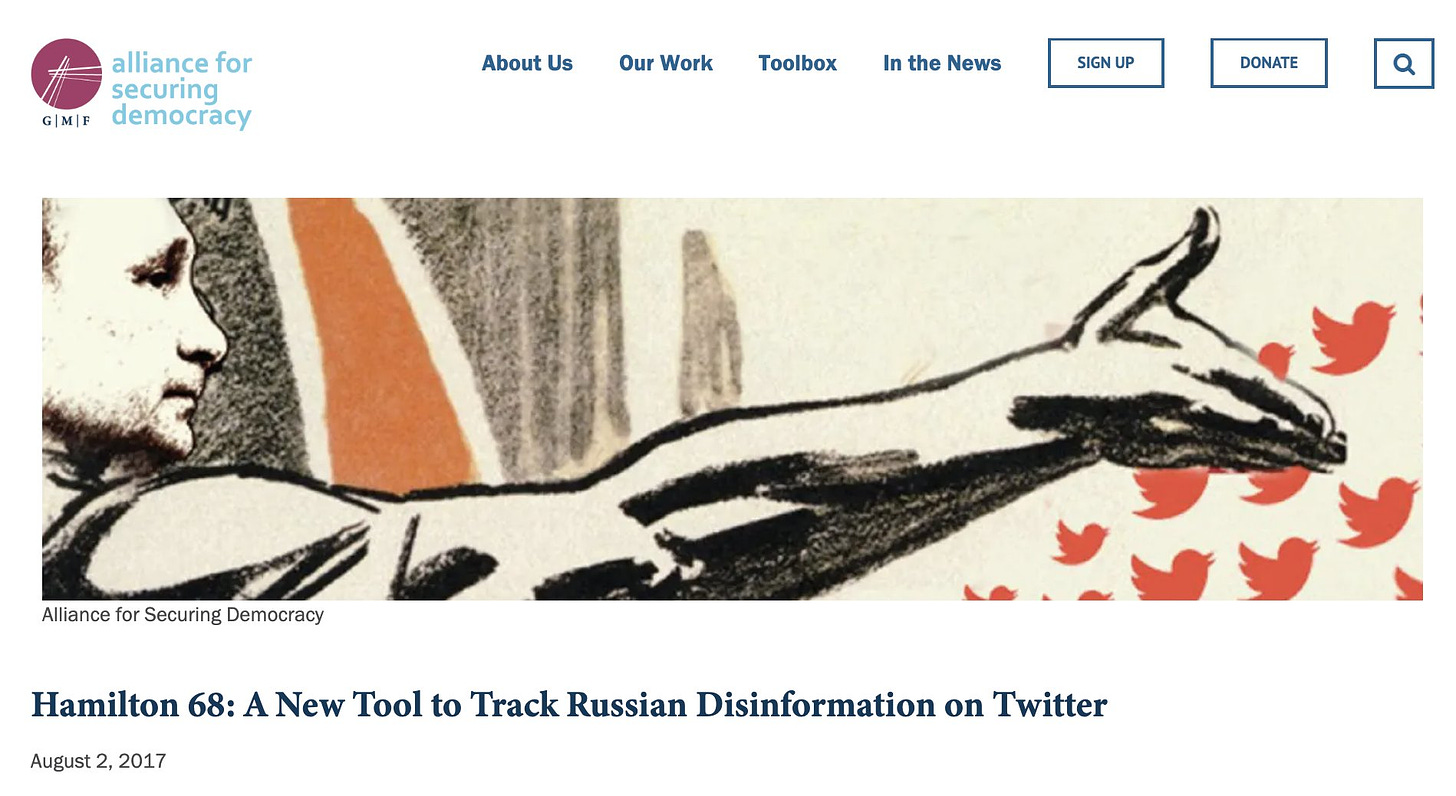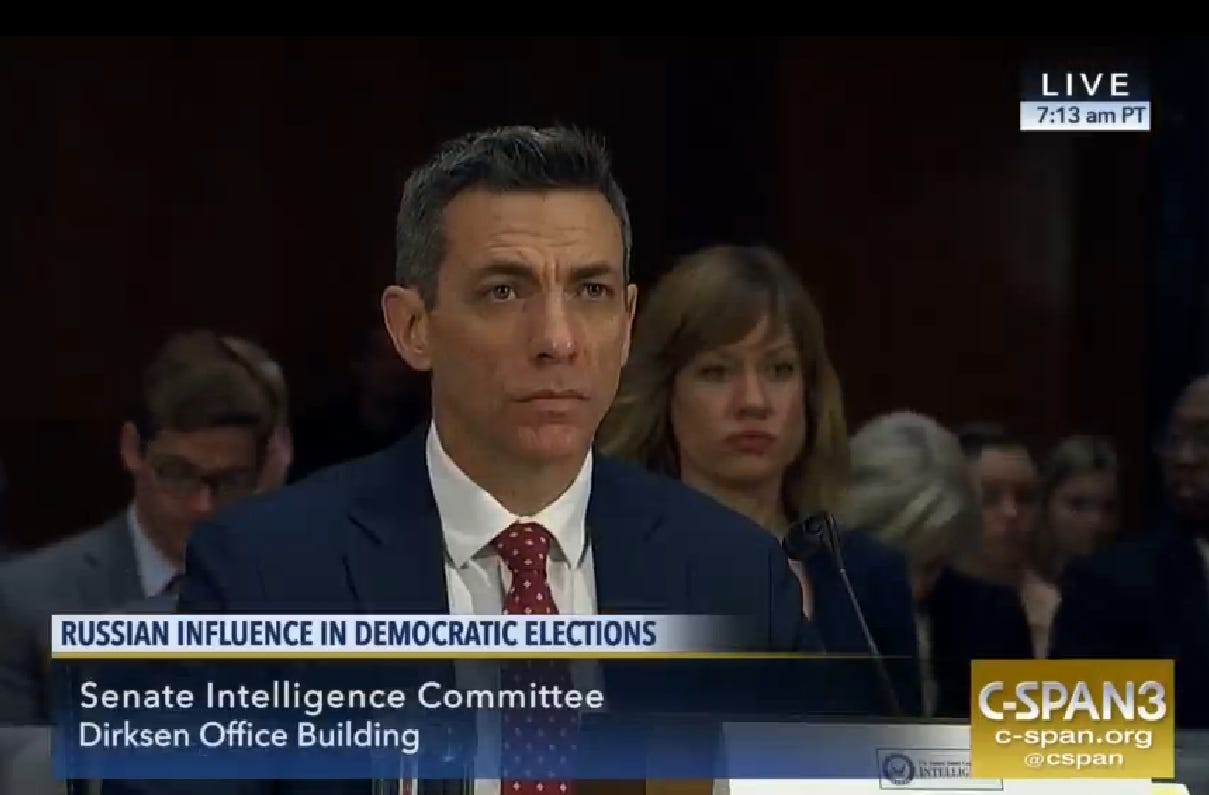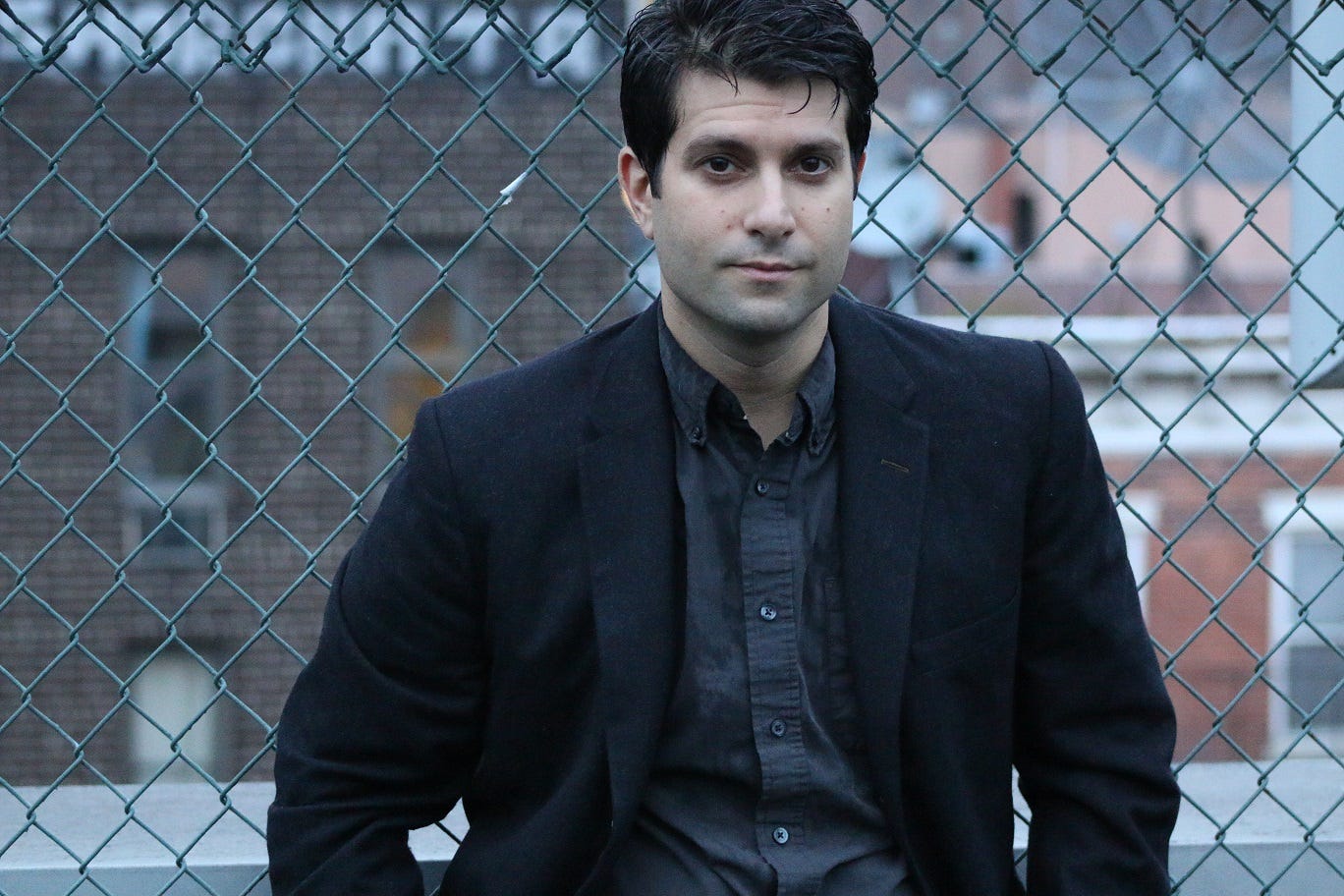THE INDICTMENT
There’s so much going on at the moment that it’s easy to forget yesterday’s news — that, oh yes, a retired Florida man has been indicted over a series of hush money payments.
What is there to add about it? At the moment it actually seems like one of these Trump stories that doesn’t stick to him — in the way that his first impeachment somehow didn’t stick to him. It seems like the public largely lost interest once the phrase “falsification of business records” surfaced — and everybody remembered that court cases actually take a long time to resolve.
First of all, there’s no question that it is politically-motivated — I don’t think anybody’s really pretending anything to the contrary. What Trump is accused of (mischaracterization of business records for tax purposes) is the sort of white-collar violation that never actually gets prosecuted, sort of the way that most people speeding down a highway won’t get pulled over. As Mitt Romney judiciously put it, “I believe President Trump’s character and conduct make him unfit for office. Even so, I believe the New York prosecutor has stretched to reach felony criminal charges in order to fit a political agenda.”
And prosecuting a former president is a sort of political Rubicon. Recently, I’ve been reading about African politics, and the really critical point there is often the ability to provide outgoing rulers with some degree of immunity in order to encourage them to leave office. If the precedent is set that ex-leaders may be prosecuted, the temptation becomes overwhelming to attempt to sail past term limits. Those sorts of calculations become very delicate in high-stakes politics all over the world, with a blind eye turned often to severe human rights violations, let alone to the falsification of business records, but they do turn out to be vital to the peaceful transition of power. As Stephen Miller in The Spectator points out, it really is only a matter of time before Republican prosecutors indict Hunter Biden, either of the Clintons, any outgoing Democratic officeholder. “Hunter Biden is going to be indicted. So is Joe, Hillary, AOC….all thanks to Alvin Bragg opening Pandora’s box,” Miller writes.
But, accepting all those as caveats, I do think it’s worth casting the die on prosecution. In The Bulwark, the attorney Philip Rotner lays out a convincing case for why the indictment is perfectly strong on legal grounds. What Trump did is a conspiratorial web with — as so often happens — the cover-up being more prosecutable than the crime. On three separate cases (to a Trump Tower doorman, to Karen McDougal, and to Stormy Daniels), he made hush money payments, as part of a ‘catch and kill’ scheme to bury damaging revelations in advance of the election. This involved Michael Cohen making the payments, with the Trump Organization reimbursing Cohen, and with records falsified to hide the transactions. But, given that Cohen had income on the books that he would have to pay taxes on, Trump paid extra to Cohen, conspiring with Cohen to create a deliberately phony tax return. As Rotner writes, “Trump hid his personal involvement, transferred his personal obligation to his company, falsified his business records, and conspired with Cohen to commit tax fraud.” All in all, not a bad case, and if, as Rotner writes, “the phrase ‘falsification of records’ sounds wimpily semantic,” it is at the same time “the ticket to court.”
In a skeptical article on the indictment for Slate, Richard Hasen writes, “It is said that if you go for the king you best not miss” and raises the really uncomfortable specter of the case being tied up in courts well past the 2024 election, with Trump reaping political capital as a martyr and with no actual legal repercussion. Hasen is definitely right about the stakes, but in this case, I believe, the circumstances warrant it. Trump is different now from who he was in 2016 or even 2020. In a piece for The Intercept Mike Giglio documents what the Trump 2024 campaign has looked like so far:
Trump has been signaling that this campaign will be different from his last two: more divisive and violent in its rhetoric, more revolutionary in its aims, and more openly intertwined with right-wing militancy and its apocalyptic mindset. In a speech at the Conservative Political Action Conference this month, he called his 2024 campaign “the final battle.”
“In 2016, I declared, ‘I am your voice,’” he said at the conference. “Today, I add: I am your warrior. I am your justice. And for those who have been wronged and betrayed, I am your retribution.”
The campaign this time around is no longer about immigration or China policy; it’s about the basic legitimacy of the federal government. It’s very significant, as Giglio writes, that Trump started his campaign in Waco, linking himself with the ‘martyrs’ of the Waco siege and with a long, sprawling tradition of domestic militancy. “They are not coming after me. They are coming after you. I’m just standing in their way,” he wrote on social media.
The rhetoric needs to be taken seriously — ‘the final battle,’ the ‘retribution.’ Trump has aligned himself as the enemy of law-and-order, and the system, in a very straightforward way, does need to act to defend itself, and to use the tools at its disposal, which, in this case, are primarily legal weapons. There is a breakdown in the democratic process by prosecuting an ex-president, by pursuing a politically-charged prosecution. It does set a terrible precedent. The gamble is that this remains just a one-off — that Trump can still, at this late day, be contained, that the system can prevail.
DISINFO
I’m very aware that I’m going to be talking out of two sides of my mouth on this post. My framing of the Trump indictment is that ‘the system’ — as opposed to the electorate — is right to pursue a politically-charged prosecution of an ex-president given the unique circumstances of Trump, while in this post on ‘disinformation’ I’m going to be railing against ‘the system’s’ attempt to manipulate information precisely so as to counteract the threat of Trumpism. But, look, these are very difficult issues, and to a great extent we are in the ‘wilderness of mirrors’ here. Familiar guardrails like liberalism and the democratic process don’t necessarily help us to orient ourselves.
The point of a recent round of alternative press coverage on this topic is that, in overcompensating for 2016, a new force emerged — the ‘disinformation industry’ or ‘Censorship Industrial Complex’ — that is coordinated across law enforcement, universities, and the media, and has been startlingly successful in massaging public narratives. The #Twitter Files were a break in understanding the ‘disinformation industry’ but were really just a glimpse of a much larger story. In a post this week summarizing his #Twitter Files reporting, Matt Taibbi writes:
When we got into the Files, we were caught off guard. The content-policing system was more elaborate and organized than any of us imagined. A communications highway had been built linking the FBI, the Department of Homeland Security, and the Office of the Director of National Intelligence with Twitter, Facebook, Google, and a slew of other platforms.
In a very long article for Tablet Magazine, Jacob Siegel, a former Army Intelligence officer, offers the most extensive take I’ve seen so far on what the Censorship Industrial Complex is and how it functions.
The key date is March 24, 2016, with Obama instituting by executive order the Global Engagement Center directed to support “government-wide counterterrorism communications activities.” Unfortunately, as Taibbi writes, “that decision may yet prove devastating to Obama’s legacy.” The executive order was the cue to mobilize a variety of new outfits, often anchored on universities — “a sprawling complex of disinformation studies ‘labs,’” as Taibbi writes — and which were concerned with a top-down management of information. The main talking-point of the disinformation industry initially was the ‘Russian hack’ narrative, the idea that Russia had so thoroughly compromised the American public sphere during the 2016 election that, essentially, the only people who could be trusted were ‘verified,’ mainstream sources of information.
One of the earliest and most egregious manifestations of the disinformation industry was an outfit called Hamilton 68 that claimed, as they wrote at their launch, to have “linked 600 Twitter accounts to Russian influence activities online.” But Hamilton 68 failed to convince even some of the very credulous and complaint Twitter executives it was peddled to. “It’s so weird and self-selecting that I think we need to just call this out on the bullshit that is,” said Yoel Roth, Twitter’s Head of Trust and Safety and otherwise villain of the #Twitter Files, in an internal e-mail. “Instead of tracking how Russia influenced American attitudes, Hamilton 68 simply collected a handful of mostly real, mostly American accounts and described their organic conversations as Russian scheming,” wrote Taibbi.
Looking back, there was always something odd about the Russia hack story and how widely disseminated it was in liberal media. At the time I assumed that liberals were simply in shock, that foreign interference was a convenient scapegoat for a lost election, but in retrospect it’s not so surprising that something else was at work. The real shock for me was of course 2020 and 2021, and the way in which the media and the entire liberal public sphere marched in lockstep in pre-packaged narratives about Covid and the vaccines, with a variety of perfectly simple, reasonable questions (e.g. were the vaccines actually effective against transmission? should people who had already had Covid get a vaccine?) completely out-of-bounds for ostensibly liberal, open-minded news outlets.
As Siegel writes, those in the disinformation complex more or less just decided that American public discourse couldn’t be trusted anymore, that a more extreme approach was needed. As Emily Bazelon baldly put it in a New York Times Magazine piece in 2020, “Increasingly, scholars of constitutional law, as well as social scientists, are beginning to question the way we have come to think about the First Amendment’s guarantee of free speech. They think our formulations are simplistic — and especially inadequate for our era.” Siegel writes: “It was the lesson that many intelligence and defense officials had drawn from the ISIS and Russian campaigns of 2014 — namely, that social media was too powerful to be left outside of state control.”
The most chilling manifestation of this development is the open use by some members of the ‘disinformation industry’ of the language of counterinsurgency (COIN). CIA officer Robert Grenier actually wrote an op-ed in The New York Times claiming that “the challenge facing us now is one of counterinsurgency” and that counterinsurgency “provides the most useful template for action.” Clint Watts, former FBI special agent and veteran of the disinformation circuit, told Congress in 2017, “America’s war with itself has already begun. We all must act now on the social media battlefield to quell information rebellions.” And Mike Benz, a former State Department official turned whistleblower, describes how companies “initially funded to help do social media counterinsurgency work effectively in conflict zones for the U.S. military” were then “redeployed domestically both on Covid censorship and political censorship.”
As Siegel writes, “For the American ruling class, COIN replaced politics as the proper means of dealing with the natives.” If Siegel can sometimes be a little overheated in his rhetoric, I don’t think his framing is wrong — and it’s certainly not a new phenomenon. I’ve been reading recently about the CIA and FBI’s extensive counter-intelligence and domestic spying operations in the 1960s, and everything here feels familiar — an ongoing struggle updated for fresh technologies. Fundamentally, the issue in the ’60s was that the poohbahs of the intelligence community, people like J. Edgar Hoover and James Angleton, just could not believe that the anti-war movement (or, for that matter, civil rights) was a genuine outpouring of popular energy. They assumed that, at bottom, it must be the result of a state-level Soviet plot, and their inability to find the plot only convinced them that it must be even more nefarious and deeply buried. The dynamics here are essentially the same — an unexpected or unpleasant turn in civic discourse (Republicans suddenly embracing more extreme, alt-right politics; Americans questioning the pronouncements of the medical establishment) and those in positions of power deciding that the normal rules of free exchange no longer apply, that discourse has moved into a domain that must be controlled by precepts of ‘national security’ if not ‘counterinsurgency.’
So, no real surprises here; nothing ever changes. What is a bit startling is the supine approach of the press. In the ‘60s and particularly the ‘70s, journalism really did cast off the shackles of the national security complex and perceived its role as being to follow a story wherever it led. But that turn has to a remarkable extent been forgotten. The current compliant attitude of the press manifests most obviously in the overnight emergence of ‘fact-checking.’ As Siegel writes, “The modern ‘fact-checking’ industry, which impersonates a well-established scientific field, is in reality a nakedly partisan cadre of compliance officers for the Democratic Party” — the overwhelming and often ridiculous tendency in the fact checks being, in complicated, multi-faceted stories, to cite as ‘facts’ simply well-rehearsed bits of consensus. And the compliance of the press appears as well in its utter refusal to cover major stories, like the revelations about the disinformation industry. As Siegel writes, “When proof emerged earlier this year that Hamilton 68 was a high-level hoax perpetrated against the American people, it was met with a great wall of silence in the national press.” The #Twitter Files — obviously a journalistic bombshell — were dismissed or simply ignored by major media outlets, and established journalists resorted to attacking the bona fides of the reporters who had been given the scoop. In The New York Times, David Wallace-Wells referred to the #Twitter Files reporters as “quasi-journalists” — pretty rich stuff given that Taibbi has been a professional journalist for thirty years, won a National Magazine Award and Sidney Award, among other, and that Bari Weiss is a former colleague. And, in a recent hostile interview with Taibbi, a vintage case of shooting the messenger, MSNBC host Mehdi Hasan completely ignored the substance or implications of the #Twitter Files for the media-at-large and went after Taibbi for some very minor errors in reporting.
What’s difficult for me in dealing with the phenomenon of the disinformation industry is that I’m not exactly ready to denounce it wholesale as critics like Siegel do. I believe that Trump really is an extraordinary circumstance and requires some extraordinary measures. And certain of the ‘disinformation industry’ advocates are insistent that what they are involved is a highly temporary emergency measure given an existential threat to the republic. There’s an interesting and surprisingly personal critique of the ‘censorship complex’ by Michael Shellenberger, focusing on one of its ‘intellectual architects,’ Renee DiResta. Shellenberger claims that DiResta is CIA-affiliated (she has admitted to being part of a CIA fellowship program in college but denies that her connection continued past then), that she was intimately involved in a ‘false flag’ effort to depict Alabama Senate candidate Roy Moore as Russia-backed, and that she has used her position at the Stanford Internet Observatory to “bring to the US the kinds of influence operations the US has used to influence elections in past decades.” But DiResta, both in Shellenberger’s piece and in her reply, comes across as surprisingly sympathetic. She is patriotic and really does believe that she is doing what any other citizen would do to impact public discourse (and is doing it more effectively than most).
But claims of ‘emergency’ and ‘extraordinary circumstances’ are always dangerous. It should be a shock that the FBI was regularly meeting with Twitter executives in advance of the 2020 election, and even more so that, as Taibbi reports, CIA representatives were present for at least some of these meetings (and notwithstanding that the CIA has no mandate to operate within the U.S., let alone to intervene in an election). And it should be deeply alarming that the sort of censorship complex that was so active in the Cold War, that was glimpsed in the Snowden revelations, clearly wields outsize influence over press outlets and social media platforms. The question, as Siegel and Shellenberger both ask, is how to dismantle it, which is both easier and more difficult than it looks. On the one hand, censorship and governmental overreach will never disappear. National security and counterintelligence are, in their own ways, vital public services but ones that are uniquely subject to abuse — they will always be with us. On the other hand, the logic of counterintelligence is fairly easy to follow. It thrives on monopolies, on limited sources of ‘information’ and ‘authority,’ it simply becomes overmatched when dealing with a genuinely diffuse public sphere full of independent actors. Given the nexus of government and monopolistic media outlets, all that’s called upon, really, is for civil society to just be smarter. Don’t accept uncritically the narratives of ‘authoritative’ outlets. Read widely. Question. Be very suspicious of narratives like Russian ‘infiltration’ and Covid ‘misinformation’ that seem to pop up suddenly and to be widely parroted. Civic discourse is a fragile thing. It can come under threat externally or (far more frequently) internally, from government overreach. It relies on us to fight for it.










Re The Indictment, the solution envisioned by the Constitution for Trump's actions is impeachment and conviction, removing him from office, with another vote to bar him from running again, as provided by the 14th amendment, enacted to make it possible to ban leading Confederates from holding federal office. (Although, to be fair, it is not certain whether or not this clause applies to the president, or just other offices.)
In a less formal way, it did happen to Nixon, who according to the accepted lore, was told by the leading Republicans half a century ago that if he did not resign, he likely would be impeached and convicted. President Ford, in pardoning Nixon, cited as a reason that he had been punished enough.
This time around the Republicans did not support either the conviction or resignation option. So we are left with the mess that Trump could well be convicted of a state crime bumped up to a felony with jail time for violating a federal law that, if elected, he cannot pardon himself for. Situations like this are why few countries in history survive for 250 or more years.
The behavior of the left and right regarding Covid leaves me only semi-sure about one thing: We're screwed when the major killer pandemic comes around—the one with the 5% fatality rate or worse.